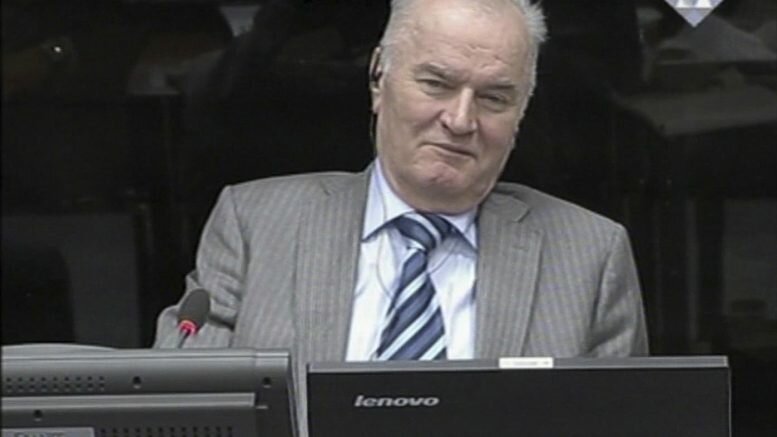On the charge sheet of former army chief Ratko Mladic is the Srebrenica massacre.
On Wednesday, the sentence will be read for the ‘ Bosnia slaughter’.
‘The announcement of the verdict in this case will take place on Wednesday, 22 November at 10.00’, said a statement from the UN appointed International Criminal Tribunal for former Yugoslavia in The Hague (ICTY) a month ago.
The 74 year old former Bosnian-Serbian army chief should be sentenced to life for war crimes in former Yugoslavia, was the prosecution’s demand when it presented Its case in December last year.
Worst atrocities since World War II
He went by the nickname ‘The Butcher of Bosnia’. An estimated 8,000 Muslim boys and men were massacred by Serbian soldiers in Srebrenica between the 11th and 19th of July 1995.
This is considered to be the worst war crime committed in Europe since the end of World War II.
Both the ICTY, and the International Court of Justice (ICJ) in The Hague have determined that the Srebrenica massacre was a genocide.
Mladic was perhaps the most well-known military chief under the leadership of the Yugoslav President, Slobodan Milosevic. Mladic was filmed as he was preparing for what would be the massacre of 8,000 Muslims.
Serbian nationalism
Milosevic sent Mladic to Croatia in 1991 to put down the independence movement. He led the Yugoslav army’s bombing of the port city of Dubrovnik, and was later stationed in Sarajevo.
Mladic led the siege by the army of the civilian population in the Bosnian capital. Sarajevo was besieged for 44 months. At least 10,000 of the city’s residents were killed.
In 1992 , Mladic was nominated by Bosnian Serbian President, Radovan Karadzic to lead the struggle for a Serbian Bosnia. The two became the symbol of the Serbian campaign for ethnic cleansing of Croats and Bosnian Muslims. Mladic was described as a reckless army leader motivated by Serbian nationalism.
Powerful
‘He was almost the Almighty on the military side. In Bosnia, nobody did, in principle, anything without Mladic’s approval,’ said Bo Pellnäs, a security policy commentator, who was a part of the Swedish UN mission to the Balkans in the early 1990s.
Pellnäs reported that he met Mladic several times in various negotiation situations. He remembers an army leader who became increasingly difficult.
‘People who are at war for several years are very psychologically affected. It’s not that I think Mladic created his cruelty, but he was under stress, and was in a downward curve ,’ said Pellnas.
Mladic was on the run for 16 years until he was arrested in the Serbian city of Lazarevo, about 80 kilometres north of Belgrade in May 2011 (following an anonymous tip).
He was living on his cousin’s farm, under an assumed name. He was sent to The Hague, where he was first charged by the war crimes tribunal one month later.
‘These are abominable charges. I have never heard such monstrous words’, said Mladic, arguing that he’d simply been defending his people, and his country.
© NTB Scanpix / Norway Today




